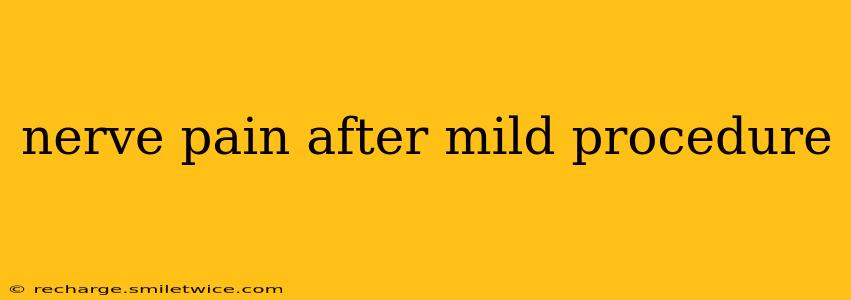Experiencing nerve pain after a seemingly mild medical procedure can be frustrating and concerning. While many procedures are minimally invasive, there's always a chance of unintended nerve irritation or damage. This article explores the potential causes of post-procedure nerve pain, effective treatment options, and preventative measures to minimize the risk. We'll also address common questions surrounding this issue.
What Causes Nerve Pain After a Mild Procedure?
Several factors can contribute to nerve pain following a minor medical intervention. These include:
-
Direct Nerve Injury: Even a small surgical instrument or needle can inadvertently damage a nearby nerve during the procedure. This is more likely in areas with superficial nerves.
-
Inflammation: The body's inflammatory response to the procedure can irritate surrounding nerves, leading to pain. This inflammation can be localized to the procedure site or more widespread.
-
Nerve Compression: Swelling or hematoma (blood clot) formation after the procedure might compress nearby nerves, causing pain. This compression can be temporary or, in some cases, more persistent.
-
Entrapment: Scar tissue formation following the procedure can trap or compress nerves, leading to chronic pain. This is a more significant concern with procedures involving significant tissue manipulation.
How Long Does Nerve Pain After a Mild Procedure Last?
The duration of nerve pain varies greatly depending on the severity of the nerve injury, the individual's healing response, and the type of procedure. In many cases, mild nerve pain resolves within a few days to weeks. However, more significant nerve injury may result in pain lasting several months or even longer, potentially becoming chronic.
What are the Treatment Options for Post-Procedure Nerve Pain?
Treatment for post-procedure nerve pain depends on the severity and duration of the symptoms. Common approaches include:
-
Over-the-counter pain relievers: Medications like ibuprofen or acetaminophen can help manage mild to moderate pain.
-
Prescription medications: Stronger pain relievers, such as opioids (used cautiously due to potential side effects), or anti-inflammatory drugs may be prescribed for more severe pain.
-
Physical therapy: Exercises and stretches can help improve nerve function and reduce pain.
-
Nerve blocks: Injections of anesthetic or steroid medications near the affected nerve can temporarily block pain signals.
-
Alternative therapies: Some individuals find relief through alternative therapies such as acupuncture, massage therapy, or chiropractic care.
Can Nerve Pain After a Minor Procedure Be Prevented?
While not all cases of post-procedure nerve pain are preventable, minimizing the risk involves:
-
Choosing experienced practitioners: Selecting a skilled and experienced healthcare professional reduces the chance of nerve injury during the procedure.
-
Open communication: Discuss any concerns or previous nerve issues with your healthcare provider before the procedure.
-
Following post-procedure instructions carefully: Adhering to post-operative instructions, such as avoiding certain activities or applying ice packs, helps minimize inflammation and swelling.
-
Early intervention: Contacting your healthcare provider promptly if you experience persistent or worsening nerve pain allows for early diagnosis and treatment.
What are the Common Types of Mild Procedures That Can Cause Nerve Pain?
Several seemingly minor procedures carry a small risk of nerve pain. These include:
-
Injections: Injections, such as those for vaccinations or local anesthesia, can occasionally cause nerve irritation.
-
Dental procedures: Certain dental procedures, especially those involving extractions or nerve-adjacent work, can lead to temporary or persistent nerve pain.
-
Minor surgeries: Even small surgical procedures, like the removal of cysts or skin tags, carry a small risk of nerve damage.
-
Endoscopy procedures: While usually minimally invasive, endoscopy can sometimes cause nerve irritation in the surrounding tissues.
Is Nerve Pain After a Mild Procedure Always Serious?
Not all nerve pain after a mild procedure is serious. Often, it's temporary and resolves quickly. However, persistent, worsening, or severe pain warrants immediate medical attention. It's crucial to contact your healthcare provider to rule out any significant nerve damage or complications.
Disclaimer: This information is intended for general knowledge and informational purposes only, and does not constitute medical advice. Always consult with a qualified healthcare professional for any health concerns or before making any decisions related to your health or treatment.
